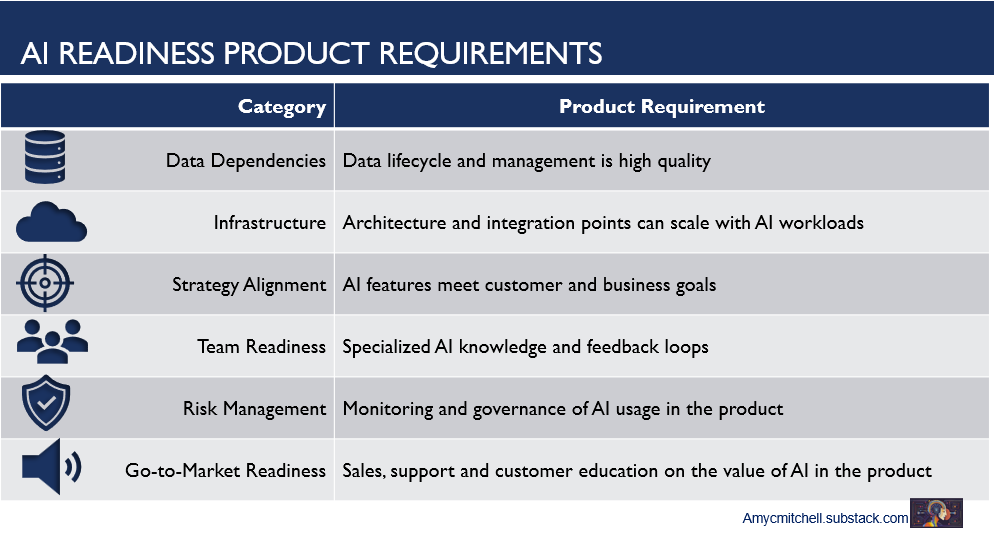Spending on generative AI grew significantly this year. This is creating opportunities for products of all types. With all the AI in the air, AI will inevitably come to your product soon.
Is your product ready for AI? Should you treat AI features like any other new product feature?
Before rushing to add AI features, preparing your product for AI is important.
Why Product Fitness for AI Matters
Getting your product fit for AI is a proactive and strategic step. AI in your product has some unique risks:
AI can produce surprises in real-life usage: the models don't always produce the same result
Data dependencies: poor data can make AI features ineffective or harmful
Compliance concerns: privacy and legal requirements can be stricter for AI than traditional features
Business model impacts: AI can introduce strategic pricing changes
Continuous updates: AI isn't a static feature - models require updates to stay relevant
The stakes are higher: an AI mistake can damage your product's reputation or lose customer trust
Another consideration is the cost of rework later. Pausing to address critical operational issues can significantly impact your product's business!
The Product AI Fitness Strategy
Addressing your product's fitness for AI is strategically important as you add AI features.
However, there is tremendous pressure to embed AI in all types of products. The benefit is capturing business while customers are allocating budgets to AI. No product manager wants to slow the business growth from AI!
A winning strategy is to initiate a parallel workstream to get started on product fitness for AI. As you build your business case for the new embedded AI features, you can include key product fitness requirements.
The AI Readiness Checklist for Product Managers
Whether you have AI features near term or in the future, you can take steps to protect your product from the new risks from AI features.
The major categories of AI readiness are:
Data readiness
Infrastructure support
AI strategy alignment
Team readiness
Feature readiness
Risk management
Go-to-market readiness
Monitoring and iterating
A unique aspect of AI features is the post-launch requirements to keep the product healthy. A few of the ongoing post-launch items to monitor are:
Making sure the data used in the AI features stays clean and in compliance
Scaling of the AI workloads
Customer and business goals for AI are being met
AI developments are monitored for impacts on your solution
Ongoing audits and governance checks
Customer feedback loop
Often product managers are tasked with monitoring after the launch of new features.
In the case of AI, product managers need data management and AI experts to assist with ongoing guidelines for safe AI usage.
Whether you have AI in your product or not, this checklist can save you rework in the future. With AI infusing so much in high tech, an AI-ready product foundation gets people and processes ready to spring into action when needed.
How to Start Preparing for AI-Readiness
Before you are caught off guard by AI developments, you can take steps to make sure your product is fit for AI features. Groundwork can begin now by using the checklist to evaluate your product's readiness.
Some of the AI readiness questions will need research and will provide a good reason to collaborate with data management experts, engineering, quality, and legal teams.
After doing the AI readiness assessment, you will have a good picture of your product's readiness for AI features. Depending on the AI features in your product and the readiness assessment, you can determine the priority for handling AI readiness. The table below shows the priority based on the assessment and features:
If your product has a high dependency on AI and the readiness is low, then you'll need to put priority on readiness. Otherwise, continue to monitor your readiness and push for more progress.
This article highlights the key areas for AI readiness, but if you want to go further, here is a starting checklist to evaluate your product today (paid subscribers only). This early access version includes AI readiness categories and 40+ targeted questions to assess your product.
Conclusion - The Hidden Costs of Being Unprepared
AI features may unlock new opportunities, but without preparation, the risks can outweigh the rewards. Neglecting your product's fitness for AI can lead to costly rework, compliance challenges, and loss of customer trust. By proactively addressing readiness, product managers can ensure their product isn’t just riding the AI wave but leading it.
AI is more than a feature—it's a shift. Make sure your product is ready to thrive in the AI-driven future.
TLDR Product listed Product Management IRL articles recently! This biweekly email provides a consolidated email of recent product management articles.
Last week’s backstory for paid subscribers was responding to constructive feedback on a recent posting. A Side Project on Operating Principles
Connect with Amy on LinkedIn, Threads, Instagram and Bluesky.







AI is a foundation for reshaping how products evolve. As a lifelong learner, I’ve realized that rushing to adopt technology without preparation often leads to more lessons in what not to do. The balance lies in curiosity matched with readiness. By grounding AI features in a thorough readiness strategy, we set the stage for sustainable innovation.
What do people think is the most overlooked aspect of AI readiness that could either make or break a product’s success in the future?